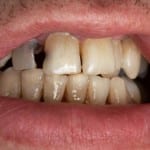 There are lots of things that can go wrong in your mouth, from tooth decay and gum disease to rotting teeth and you would normally attempt to do something about this in Leeds, because if not, this can lead to an even more awkward situation that may be harder to get rid of- bad breath. It’s not only poor oral hygiene and conditions in the mouth that can cause foul odours; there are a lot more complex issues that could be attached to your problem, maybe even serious, as bad breath indicates decay of some sort somewhere in either your mouth, or your body. You need to seek immediate advice and help from your dentist; it could mean a bit of repair work is required, and it does mean you will have to ring the changes to your lifestyle. You must try to cut down on some of the seedier habits you have a love of, like smoking, drinking and poor diet; this will help to re-address some level of balance to your teeth and gums again. But the real work comes with your oral hygiene and it must greatly improve. New products may be required: herbal remedies are very good for fighting bad breath as well, so you should throw everything you can at the condition the first time you discover you are having problems.
There are lots of things that can go wrong in your mouth, from tooth decay and gum disease to rotting teeth and you would normally attempt to do something about this in Leeds, because if not, this can lead to an even more awkward situation that may be harder to get rid of- bad breath. It’s not only poor oral hygiene and conditions in the mouth that can cause foul odours; there are a lot more complex issues that could be attached to your problem, maybe even serious, as bad breath indicates decay of some sort somewhere in either your mouth, or your body. You need to seek immediate advice and help from your dentist; it could mean a bit of repair work is required, and it does mean you will have to ring the changes to your lifestyle. You must try to cut down on some of the seedier habits you have a love of, like smoking, drinking and poor diet; this will help to re-address some level of balance to your teeth and gums again. But the real work comes with your oral hygiene and it must greatly improve. New products may be required: herbal remedies are very good for fighting bad breath as well, so you should throw everything you can at the condition the first time you discover you are having problems.






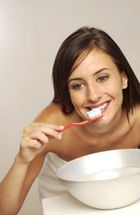 Taking care of your teeth might seem like a daunting business, especially if you have suffered from poor oral hygiene in the past. But don’t be intimidated by it; following a simple set of instructions so that they become habits will help you with maintaining excellent oral hygiene for the rest of your life. Read on to find out more!
Taking care of your teeth might seem like a daunting business, especially if you have suffered from poor oral hygiene in the past. But don’t be intimidated by it; following a simple set of instructions so that they become habits will help you with maintaining excellent oral hygiene for the rest of your life. Read on to find out more! It’s not a pretty sight having to smile at people in central Leeds when you have decayed teeth. It’s not only ugly to look at, but it can also be very dangerous to your health. It will start to develop by having a poor oral hygiene regime and irregular visits to dentist. If plaque continues to build up in the mouth, tartar will form and gum disease will set in, causing the teeth to rot; not only are these problems difficult to reverse, but expensive too, and tooth decay is a whole lot easier to prevent than to cure. Certain foods that contain a lot of sugar or starch need to be removed after eating, as they can lead to bacteria forming in the mouth. Regular brushing with a good brush and paste, followed by flossing and rinsing, should be enough to counter the build up of plaque- that and regular visit to the dentist. If decay or a cavity sets in, a dentist will be able to rectify this with a simple filling- if caught early enough. But if the problem is allowed to go on, you may require a root canal and crown; you may even loose the tooth altogether, even worse it will spread throughout the rest of the mouth very quickly. You may also like to consider, gum disease and tooth decay are directly linked to heart disease and strokes.
It’s not a pretty sight having to smile at people in central Leeds when you have decayed teeth. It’s not only ugly to look at, but it can also be very dangerous to your health. It will start to develop by having a poor oral hygiene regime and irregular visits to dentist. If plaque continues to build up in the mouth, tartar will form and gum disease will set in, causing the teeth to rot; not only are these problems difficult to reverse, but expensive too, and tooth decay is a whole lot easier to prevent than to cure. Certain foods that contain a lot of sugar or starch need to be removed after eating, as they can lead to bacteria forming in the mouth. Regular brushing with a good brush and paste, followed by flossing and rinsing, should be enough to counter the build up of plaque- that and regular visit to the dentist. If decay or a cavity sets in, a dentist will be able to rectify this with a simple filling- if caught early enough. But if the problem is allowed to go on, you may require a root canal and crown; you may even loose the tooth altogether, even worse it will spread throughout the rest of the mouth very quickly. You may also like to consider, gum disease and tooth decay are directly linked to heart disease and strokes. Being told that you have cancer can be one of the most devastating pieces of news you ever receive. But though the treatment of cancer has evolved greatly over the last 50 years, it is in response to the fact that cancer is still on the increase, as it is in the mouth. Oral cancer is considered to be directly linked to diet, stress and poor oral hygiene that work their way throughout the body. Only by understanding the causes of cancer and the signs of it, can we prevent it happening in Leeds. There are many early signs of the disease in the mouth; patches in the mouth, bad breath, sores or ulcers that won’t go away, swallowing pains, loose teeth and constant earaches. Any problems like these should be discussed with your dentist immediately so that the cancer can be caught as early as possible. They can run a series of simple tests through cell and tissue diagnosis of the mouth. Sometimes a blood test at the doctors can also highlight any abnormalities. If anything shows up, more intensive tests can be done to gauge the extent of the problem and give a better understanding of the treatment required. If cancer is caught early, it can be treated a lot easier and though the thought of being diagnosed with oral cancer is very frightening, success rates of treatment are on the increase, thanks to advances in technology and our understanding of what cancer is causes it. Learn all you can about it, how to fight it and how to prevent it- it can be beaten.
Being told that you have cancer can be one of the most devastating pieces of news you ever receive. But though the treatment of cancer has evolved greatly over the last 50 years, it is in response to the fact that cancer is still on the increase, as it is in the mouth. Oral cancer is considered to be directly linked to diet, stress and poor oral hygiene that work their way throughout the body. Only by understanding the causes of cancer and the signs of it, can we prevent it happening in Leeds. There are many early signs of the disease in the mouth; patches in the mouth, bad breath, sores or ulcers that won’t go away, swallowing pains, loose teeth and constant earaches. Any problems like these should be discussed with your dentist immediately so that the cancer can be caught as early as possible. They can run a series of simple tests through cell and tissue diagnosis of the mouth. Sometimes a blood test at the doctors can also highlight any abnormalities. If anything shows up, more intensive tests can be done to gauge the extent of the problem and give a better understanding of the treatment required. If cancer is caught early, it can be treated a lot easier and though the thought of being diagnosed with oral cancer is very frightening, success rates of treatment are on the increase, thanks to advances in technology and our understanding of what cancer is causes it. Learn all you can about it, how to fight it and how to prevent it- it can be beaten.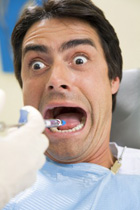 We all know how important it is to have regular check-ups with our dentist. However, a large section of the British public is nervous about visiting the dentist. What starts off with avoiding making an appointment can lead to poor oral hygiene and chronic disorders of the mouth. However, modern dentistry is far more comfortable than in the past, giving patients the opportunity to overcome their anxieties.
We all know how important it is to have regular check-ups with our dentist. However, a large section of the British public is nervous about visiting the dentist. What starts off with avoiding making an appointment can lead to poor oral hygiene and chronic disorders of the mouth. However, modern dentistry is far more comfortable than in the past, giving patients the opportunity to overcome their anxieties.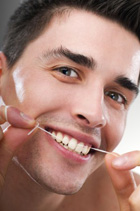 Crooked, misaligned teeth have many causes, from trauma to childhood thumb-sucking. They can dash one’s confidence and lead to a lifetime of poor oral hygiene. Central Leeds dentists are now offering a chance to put an end to this forever with the fitting of braces. Why delay achieving your perfect smile? Braces work with your teeth to ensure lasting, optimum alignment and bite that will mean you can show off your teeth with confidence.
Crooked, misaligned teeth have many causes, from trauma to childhood thumb-sucking. They can dash one’s confidence and lead to a lifetime of poor oral hygiene. Central Leeds dentists are now offering a chance to put an end to this forever with the fitting of braces. Why delay achieving your perfect smile? Braces work with your teeth to ensure lasting, optimum alignment and bite that will mean you can show off your teeth with confidence. Bad breath, if you`re lucky can be simply down to odorous foods eaten earlier on, if you`re not so lucky it can be down to a poor dental hygiene regime says a Leeds dentist. Some dental patients are even diagnosed with unrelated diseases that can be a cause of poor breath. If you`re diabetic or suffer from a liver disease then this can be the cause, but for most of us it’s a case of a poor hygiene plan. At every dental surgery there is a dental hygiene nurse, and their job is to give that extra after care to patients, especially in preventative dental matters. Start by consulting them, and in the meantime try these simple, but affective ways of cleaning your teeth and keeping acid and bacteria production down. Flossing is the most understated method of clean teeth that is available; it will loosen up and remove the food debris that causes acid. So, start off the day with a good flossing, get floss that suits you as well, ask the people in the chemist to recommend one. After that, brush your teeth vigorously and don`t forget those nooks and crannies. Then rinse your mouth with a good, not a cheap, mouth rinse, and carry with you a tooth pick and floss stick. Every time you eat something, floss and pick, then rinse with water. This will keep acid at bay, and with it the bacteria that causes bad breath, chewing mints will just temporarily hide the problem. Also drink water throughout the day as this too will help.
Bad breath, if you`re lucky can be simply down to odorous foods eaten earlier on, if you`re not so lucky it can be down to a poor dental hygiene regime says a Leeds dentist. Some dental patients are even diagnosed with unrelated diseases that can be a cause of poor breath. If you`re diabetic or suffer from a liver disease then this can be the cause, but for most of us it’s a case of a poor hygiene plan. At every dental surgery there is a dental hygiene nurse, and their job is to give that extra after care to patients, especially in preventative dental matters. Start by consulting them, and in the meantime try these simple, but affective ways of cleaning your teeth and keeping acid and bacteria production down. Flossing is the most understated method of clean teeth that is available; it will loosen up and remove the food debris that causes acid. So, start off the day with a good flossing, get floss that suits you as well, ask the people in the chemist to recommend one. After that, brush your teeth vigorously and don`t forget those nooks and crannies. Then rinse your mouth with a good, not a cheap, mouth rinse, and carry with you a tooth pick and floss stick. Every time you eat something, floss and pick, then rinse with water. This will keep acid at bay, and with it the bacteria that causes bad breath, chewing mints will just temporarily hide the problem. Also drink water throughout the day as this too will help. The oral cavity can be an indicator of overall health. Many diseases that affect the body are first visibly noticed by an examination of the mouth. This explains why doctors always examine your tongue during check ups and when looking to make a diagnosis. But it can also work the other way round. Your overall health can be affected by the health of your mouth.
The oral cavity can be an indicator of overall health. Many diseases that affect the body are first visibly noticed by an examination of the mouth. This explains why doctors always examine your tongue during check ups and when looking to make a diagnosis. But it can also work the other way round. Your overall health can be affected by the health of your mouth.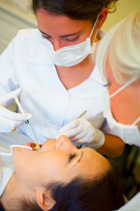 Having a tooth extraction is a pretty unpleasant experience in itself and you no doubt would expect some discomfort for a few days afterwards, but if the pain doesn’t go away, and even begins to get worse, you might be suffering from another condition called dry socket.
Having a tooth extraction is a pretty unpleasant experience in itself and you no doubt would expect some discomfort for a few days afterwards, but if the pain doesn’t go away, and even begins to get worse, you might be suffering from another condition called dry socket.

